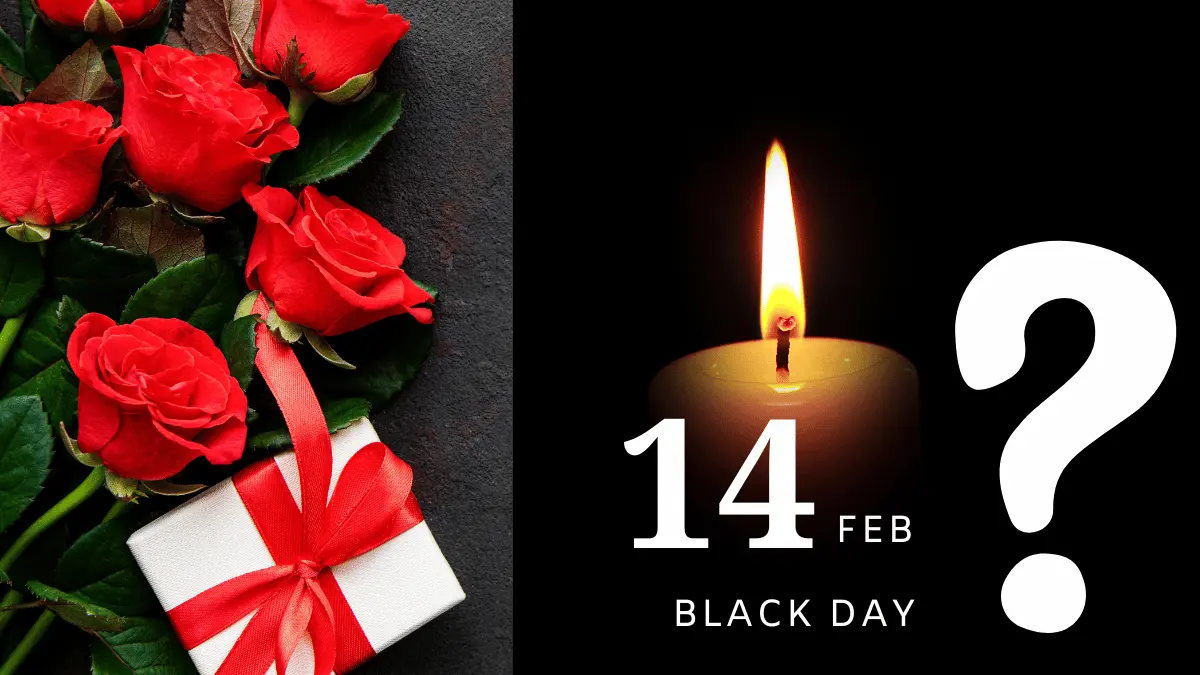Every year, Valentine’s Day takes a different meaning in India. February 14th is marked as a “black day” to remember the 2019 Pulwama attack, a day etched in grief and sacrifice. Delve into the tragedy, its impact, and how India remembers its fallen heroes.

Introduction:
In a world adorned with red and pink on February 14th, India stands apart. While love stories unfold across the globe, this date carries a somber silence in hearts across the nation. It’s a day designated as a “black day,” etched in the collective memory of a gruesome event – the Pulwama attack of 2019.
The Shadow Cast on a Bright Day:
The year was 2019. February 14th dawned like any other, filled with hope and anticipation. Little did anyone know that a convoy of Central Reserve Police Force (CRPF) personnel traveling on the Jammu-Srinagar National Highway would soon become the target of a horrific attack. A suicide bomber from the Jaish-e-Mohammed terrorist group unleashed a devastating explosion, shattering lives and forever altering the course of a bright day.
Remembering the Fallen Heroes:
The attack claimed the lives of 40 brave CRPF jawans, leaving behind a void that echoed with grief and anger. Each name, each face, represented a story – a son, a father, a brother, a friend. Their dedication to duty, their selfless service to the nation, became etched in the national consciousness. The nation mourned, united in a shared sense of loss and outrage.
Beyond the Immediate Shock:
The Pulwama attack wasn’t just a tragedy; it was a stark reminder of the vulnerabilities faced by the nation. It sparked debates on national security, terrorism, and the need for vigilance. The attack had a ripple effect, impacting not just families directly affected but the entire nation’s psyche.
A Nation United in Remembrance:
In the face of tragedy, India stood tall. February 14th was declared a “black day” to commemorate the sacrifices made and to send a message of solidarity. Candlelight vigils illuminated cities, tributes poured in from all corners, and the spirit of national unity resonated like a defiant roar.
More Than Just a Day:
While February 14th serves as a poignant reminder of the attack, its significance extends beyond a single day. It represents a call to action, a renewed commitment to fighting terrorism and ensuring the safety of our brave soldiers. It’s a day to remember the sacrifices made, honor the fallen heroes, and strengthen our resolve to build a safer India.
Beyond Grief: Stories of Resilience and Hope:
Amidst the darkness, stories of resilience emerged. Families of the victims displayed extraordinary strength, their voices echoing with determination and a call for justice. The nation rallied behind them, offering support and hope. Initiatives were launched to provide assistance to the affected families, ensuring their well-being and honoring the sacrifices made.
Moving Forward with Resolve:
The Pulwama attack undoubtedly left a deep scar on the nation’s memory. However, it also served as a catalyst for change. The attack led to increased vigilance, stronger security measures, and a renewed focus on combating terrorism. India continues to fight these forces, determined to ensure the safety of its citizens and honor the sacrifices made by its bravehearts.
Remembering: An Act of Solidarity and Strength:
Every year, as February 14th approaches, India remembers. It’s not just a day of mourning; it’s a day of remembrance, a day of solidarity, and a day of strengthening our resolve. It’s a day to remind ourselves of the fragility of life, the importance of peace, and the unwavering courage of those who dedicate their lives to protecting our nation.
What is Black Day in India on February 14th? FAQs Answered
February 14th, popularly known as Valentine’s Day, takes a different meaning in India. While hearts bloom with love elsewhere, India marks this date as a “Black Day” to remember the tragic Pulwama attack that took place in 2019. Let’s delve into the details through 20 frequently asked questions:
1. What happened on February 14th, 2019, in Pulwama?
A convoy of Central Reserve Police Force (CRPF) personnel traveling on the Jammu-Srinagar highway was targeted by a suicide bomber from the Jaish-e-Mohammed terrorist group. The explosion claimed the lives of 40 CRPF jawans.
2. Why is it called a “Black Day”?
To commemorate the sacrifice of the martyred soldiers and express national grief, February 14th is observed as a Black Day.
3. How do people observe this day?
Candlelight vigils, tributes on social media, and remembrance gatherings are held across the country. Many educational institutions organize awareness programs.
4. What is the significance of remembering the Pulwama attack?
It serves as a reminder of the sacrifices made by our brave soldiers in the fight against terrorism, emphasizing the importance of national security and unity.
5. How did the Pulwama attack impact India?
It instilled a sense of outrage and grief across the nation, leading to increased vigilance and stronger security measures. It also sparked debates on national security and terrorism.
6. What were the long-term consequences of the attack?
The Pulwama attack heightened India’s focus on combating terrorism and strengthened its resolve to protect its security interests.
7. Who were the victims of the attack?
Forty CRPF personnel lost their lives in the attack, leaving behind families and loved ones to mourn their loss.
8. How are the families of the victims supported?
Various government and non-profit initiatives provide financial and emotional support to the families of the martyrs.
9. What steps has India taken to prevent such attacks in the future?
India has implemented stricter security measures along the borders, enhanced intelligence gathering, and strengthened its counter-terrorism efforts.
10. Does India blame any other country for the attack?
Yes, India accuses Pakistan of harboring and supporting the Jaish-e-Mohammed terror group, responsible for the attack.
11. What is the current situation in Pulwama?
While tensions remain high, the Indian government continues to take steps to ensure peace and stability in the region.
12. How can ordinary citizens contribute to remembering the Pulwama attack?
Participating in memorial events, sharing stories of the victims on social media, and supporting initiatives helping martyrs’ families are some ways to actively remember.
13. Does celebrating Valentine’s Day disrespect the Black Day?
No, individuals can choose to celebrate love differently while being mindful of the somber significance of February 14th in India.
14. What message does observing Black Day send?
It emphasizes the importance of unity, resilience, and national security while honoring the sacrifices made in the fight against terrorism.
15. How can we prevent such tragedies from happening again?
Continued vigilance, international cooperation in fighting terrorism, and promoting peace and understanding are crucial steps towards a safer future.
16. What are the ongoing challenges in combating terrorism?
Cross-border infiltration, radicalization, and funding of terrorist groups pose significant challenges.
17. What initiatives are being taken to address these challenges?
Intelligence sharing, enhanced border security, and international cooperation are key strategies to address these challenges.
18. What role can technology play in preventing terrorism?
Technology can be used for better surveillance, tracking suspicious activities, and disrupting terrorist networks.
19. What is the future outlook for peace and security in India?
While challenges remain, India continues to strive for peace and security through various initiatives and collaborations.
20. How can we create a world free from terrorism?
Education, promoting tolerance and understanding, and advocating for peaceful solutions to conflict are essential steps towards a world free from terrorism.
Remember, February 14th is not just a black day; it’s a call to action. Let us stand together, remember the sacrifices made, and work towards a future where peace and security prevail.



